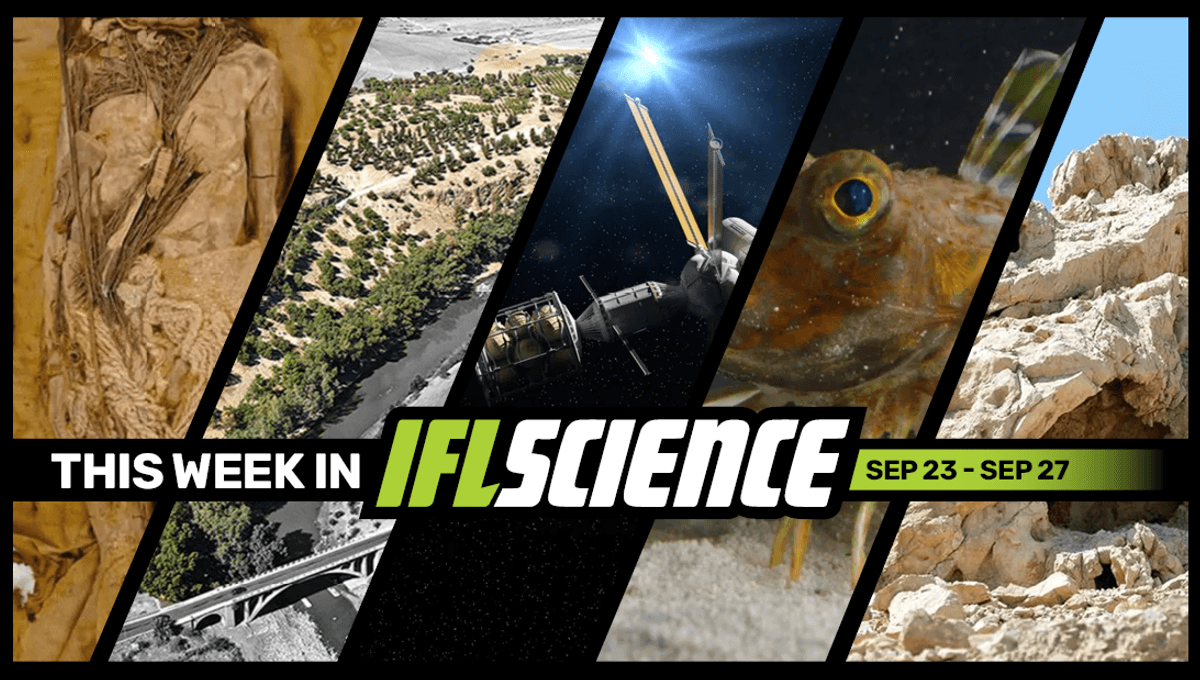
This week, evidence has been revealed of a city existing 5,400-4,900 years ago in what is now Morocco, scientists have discovered that a strange winged fish uses its “legs” like tongues to taste the sea floor, and a 1,000-year-old biblical tree has been revived from a seed found in a Judean cave. Finally, we question if the Hubble tension has been solved as astronomers race to save the standard model of cosmology.
Subscribe to the IFLScience newsletter for all the biggest science news delivered straight to your inbox every Wednesday and Saturday.
The World’s Oldest Cheese Has Been Found… Rubbed On A Bunch Of Mummies
Around 20 years ago, a group of archaeologists made a curious discovery: something had been smeared on the heads and necks of several mummies in the Xiaohe cemetery in Northwestern China’s Tarim Basin. It was a whitish substance, and clearly very old, but nobody knew exactly what it was. Now, a new study has solved the mystery: they were looking at the world’s oldest known cheese sample. Read the full story here
Five Thousand Years Ago, Africa Had A Major Civilization We Forgot
Evidence has been revealed of a city existing 5,400-4,900 years ago in what is now Morocco, that its discoverers claim was the era’s largest in Africa outside of the Nile Basin. There are signs the region had extensive trading links with settlements across the Strait of Gibraltar in Iberia, and its influence may well have stretched much further afield around the Mediterranean. Read the full story here
The Latest Idea For Deflecting Threatening Asteroids? X-Ray Pulses
A high-powered pulse of X-rays could vaporize part of an incoming asteroid and change its trajectory in the process, a new study proposes. Whether the approach would be more cost-effective than alternatives under consideration remains to be seen, but questions also need to be asked about the safety of building a suitable instrument that could nuke an asteroid in the first place. Read the full story here
This Winged Fish Uses Strange Tongue-Like “Legs” To Taste The Seafloor – Yes, Really
Scientists have just discovered the mechanism through which a winged fish uses its “legs” to taste the seafloor. The peculiar fish is so good at tasting the seabed, in fact, that other animals follow it for clues on where to find food. Isn’t the ocean just absurd? Read the full story here
Scientists Revive 1,000-Year-Old Biblical Tree From Seed Found In A Judean Cave
Researchers have resurrected a strange seed that was discovered in a cave in the Judean desert during the 1980s. According to radiocarbon dating, the seed was over 1,000 years old when it was found, and its DNA links it to a genus of tree that, although lost today, was mentioned in the Bible. Read the full story here
TWIS is published weekly on our Linkedin page, join us there for even more content.
Feature of the week:
Hubble Tension Solved? Astronomers Race To Save Standard Model Of Cosmology
The universe is expanding at an accelerated rate, however, the nature of this expansion – why it’s expanding and why it’s doing so at such an accelerated rate – is uncertain. One culprit has been dubbed “dark energy“, a hypothetical form of energy that could be seen as anti-gravity. While what dark energy is precisely remains unknown, as a cosmological constant astronomers could roughly agree on its effects to measure the expansion rate of the universe, known as the Hubble constant. But not anymore. Read the full story here
More content:
Have you seen our e-magazine, CURIOUS? Issue 26 September 2024 is available now. This month we asked, “Should We All Be Journaling?” – check it out for exclusive interviews, book excerpts, long reads, and more.
PLUS, season 4 of IFLScience’s The Big Questions podcast continues. So far, we’ve asked:
The We Have Questions podcast – an audio version of our coveted CURIOUS e-magazine column – has begun. In episode 1, we ask How Do Sunken Cities End Up Underwater?
Source Link: The World’s Oldest Cheese Was Found Rubbed On Mummies, X-Ray Pulses Are The Latest Idea For Deflecting Asteroids, And Much More This Week